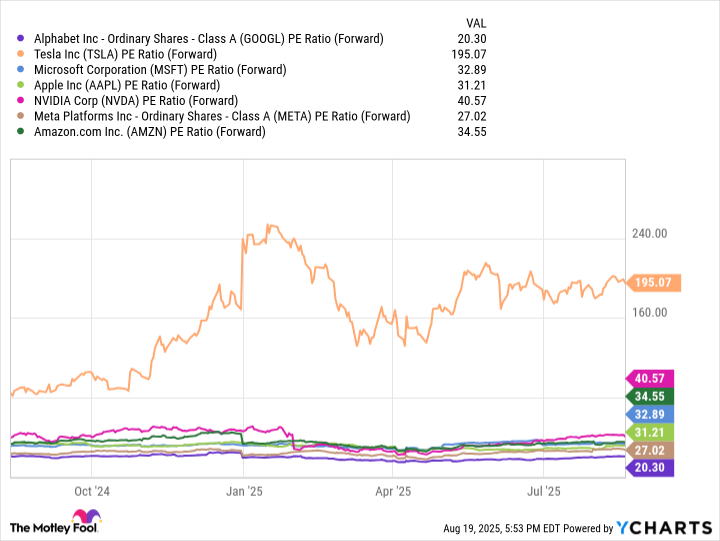Over the years, the billionaire Bill Ackman has become one of the big investors to watch. Ackman runs Pershing Square Capital Management, the investment manager for Pershing Square Holdings. The fund generated a gain of 12.7% this year through July, ahead of the broader market, and is up 23.4% over the past year.
Pershing typically invests in eight to 12 publicly traded stocks at any one time and held about $13.7 billion in publicly traded stocks at the end of the second quarter. Lately, Ackman and his team have been betting big on artificial intelligence (AI). In fact, at the end of the second quarter, roughly 45% of Pershing's portfolio was invested in just three AI stocks.
Uber: 21% of the portfolio
Ackman's and Pershing's largest position at the end of the second quarter was the ride-hailing giant Uber Technologies (UBER +0.76%), which has had a phenomenal year and is up over 55%. In February, when Ackman disclosed the position on X, he said he has been impressed by CEO Dara Khosrowshahi's transformation of the company into a "highly profitable and cash-generative growth machine."

Image source: Getty Images.
In the second quarter, Uber reported earnings in line with consensus estimates and beat estimates on revenue, while also announcing a $20 billion share repurchase program. It also grew monthly active platform users to 180 million, up 15% year over year, while customers booked 3.3 billion rides, up 18% year over year.
In an investor presentation in February, Pershing said it believes Uber can grow annual earnings per share by 30% for the next several years, and that it believes shares will more than double over the next three to four years.
But another reason investors seem to like the stock is its ability to tap into the autonomous vehicle market. While Uber is not building its own autonomous vehicles, management positioned the company as a strategic partner due to its operational excellence, regulatory experience, and strong technical platform.
The company already partners with many of the top autonomous companies like Waymo and WeRide and has begun rolling out autonomous rides on its platform. In a presentation last year, Uber said it believes the autonomous market is at least a $1 trillion opportunity.

NYSE: UBER
Key Data Points
After the big run, shares trade north of 25 times forward earnings, so they are not necessarily cheap. However, the valuation seems warranted, considering it has executed well and appears to be making solid progress on the autonomous opportunity.
Alphabet: 15.1%
If there was a value play in the "Magnificent Seven," then it would be Alphabet (GOOG +2.44%)(GOOGL +2.37%). Pershing invested over 15% of its portfolio in the stock by buying both Class A and Class C shares, and the company actually increased its position by 21% in the second quarter. The stock is only up about 6% this year and trails the broader market. It also trades at 20 times forward earnings, the cheapest of any Magnificent Seven stock.
GOOGL PE Ratio (Forward) data by YCharts; PE = price to earnings.
Alphabet has run into issues this year. The Department of Justice (DOJ) successfully sued the company for employing monopolistic practices in its search business when it came to advertising, and the DOJ has asked a federal judge to make Alphabet sell its Chrome search business. The company also is navigating an increasingly difficult world with search due to how AI chatbots and large language models are disrupting the space.
But Pershing points out that Google's AI Overviews through Gemini are showing encouraging signs, with advertising in Overviews having similar monetization rates as regular paid search. Furthermore, Alphabet owns some incredibly compelling and fast-growing businesses outside of search including YouTube, Google Cloud, Waymo, and even a chip business, DeepMind, that analysts do not think is getting enough credit. So while the stock has challenges to overcome, it looks pretty compelling as a value play in the red-hot AI sector.
Amazon: 9.3%
Amazon (AMZN +0.27%) is the newest position for Ackman and Pershing. Similar to Alphabet, Amazon owns several very compelling businesses, and Pershing was able to buy shares in April after the stock market melted down due to President Donald Trump announcing higher tariff rates. Many of Amazon's products and sellers come from China or other countries that face tariffs.
But Pershing Square's chief investment officer Ryan Israel said on its first-quarter earnings call that it has followed Amazon for a long time and strongly believes in its two core businesses: Amazon Web Services (AWS) and the large retail e-commerce business. The retail business has over 100 million products, most of which customers can essentially purchase and obtain within a day. That's a unique and valuable logistics franchise that isn't easy to replicate.

NASDAQ: AMZN
Key Data Points
Then there is Amazon Web Services, the company's cloud business that is also a major player in the AI revolution. AWS allows companies to use its data centers to manage their information technology (IT) and storage. Cloud is dominated by a few players, with AWS controlling the largest share.
Israel also pointed out that only about one-fifth of all IT workloads are actually in the cloud, but that number will increase significantly over time. Furthermore, AWS offers lots of generative AI tools and pre-built large language models that companies can integrate into their own businesses.
Tariff concerns in the e-commerce business could still be an overhang on the stock. But with Amazon's logistical expertise and scale, it's hard to believe that it won't be able to find solutions to any longer-term tariff issues.








